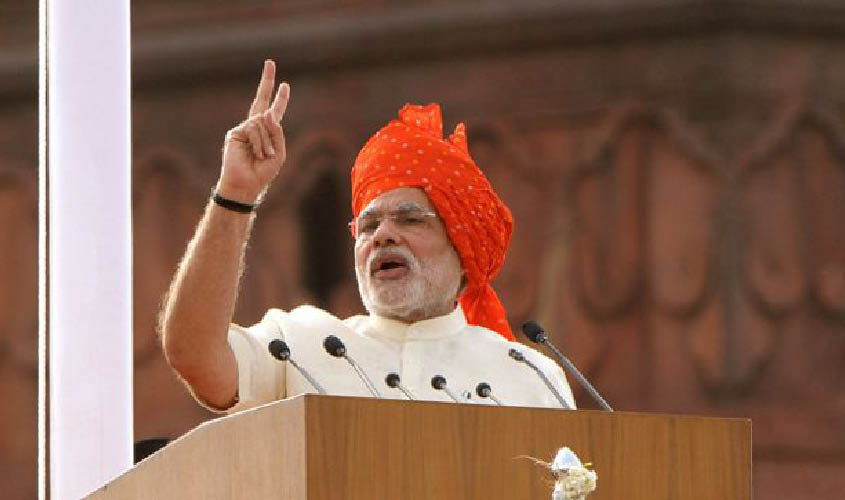If he is able to get DTC implemented, ensure that venal tax officials are penalised, he will have carried out a major reform and helped galvanise the economy.
In his Independence Day speech, Prime Minister Narendra Modi made a very important point: wealth creation should be respected. At a time when tax officers and the economic bureaucracy regard every businessman with suspicion, the statement from the ramparts of the Red Fort came as a whiff of fresh air.
“Those who create wealth for the country, those who contribute in the nation’s wealth creation are all serving the country,” he said. “We should not doubt our wealth creators. The need of the hour is to recognise and encourage the wealth creators of our nation. They should receive more honour.”
Facilitating wealth creation, however, is easier said than done. Still, it is heartening to note that somebody, and that too somebody as important as Prime Minister Modi, talks about its importance.
The most taxing problem wealth creators arguably face today pertains to taxation. It’s not just the quantum of taxation that torments them; it’s also the treatment meted out to them. Harassment is common, and its intensity is sometimes frightening. The suicide by Cafe Coffee Day owner, V.G. Siddhartha, is reported to be the result of alleged harassment by a top income tax officer.
T.V. Mohandas Pai, chairman of Manipal Global Education and former Infosys board member, who happens to be a Modi supporter, has publicly slammed tax terrorism. He told a news channel: “I have heard many horror stories about the way income tax officials treat individuals when they go on a raid… Sometimes the officials confined people for 24-36 hours. They don’t allow food to come in, they don’t allow doctors to come in, they are very aggressive and there are one or two cases where they have beaten up people and forced them to sign a letter, forced them to confess… We have elected political leaders to protect us; they cannot be a party to such treatment by tax officials…”
Against this backdrop, the Prime Minister’s assurance that his government “will not tolerate this type of behaviour” is soothing; the same is true about his tough stance against the “black sheep in the tax administration”. The assurances, however, ought to transform the policy architecture and change the behavioural pattern of tax officials.
Sadly, there is little evidence to suggest any such thing has happened so far. And it can never happen unless the prerequisite changes are made in the institutional framework. Beginning with the years under the Congress-led United Progressive Alliance when populism rose, thus straining the exchequer, the government needed more money; taxmen were given high targets. Concomitantly, they were also enormously empowered—at the expense of businesspersons. While taxmen’s discretion increased, the compliances required by businesspersons have multiplied over the years, making their lives miserable.
Not only nothing has been done in the last few years to check the discretionary powers of taxmen, they have been allowed to exercise their existing discretion to the hilt. In fact, several key officials of impeachable credentials appointed by former finance minister P. Chidambaram were allowed to continue. Unsurprisingly, anecdotes about extortion by tax officers abound. This has had consequences: high net-worth individuals have launched a Quit India movement. A Morgan Stanley report last year said that in 2014-18, 23,000 HNIs left India.
While taxmen torment HNIs, the Finance Ministry regards them as milch cows, to be milked to the maximum. In her first Budget, Finance Minister Nirmala Sitharaman hiked the tax on the super-rich, thus affirming her faith in the chief tenet of the economic philosophy of the Nehru-Gandhi Dynasty: tax the rich to eradicate poverty.
This is despite the existence of a mountain of evidence to prove that when government in India tries to end poverty, it actually gets perpetuated. This happened with Indira Gandhi’s garibi hatao stunt. Yet, Sitharaman justifies the tax by arguing that the super-rich should shoulder part of the government’s responsibility in supporting the poor.
Thankfully, public outrage in the aftermath of Siddhartha’s suicide, along with the Prime Minister’s direction, seems to have occasioned some rethink on the matter of taxation. In a number of announcements on Friday, also termed a “mini-budget”, Sitharaman tried to rein in taxmen and provide succour to businesspersons. She centralised the system of income tax orders, notices, summons, letters, etc. Foreign portfolio investors or FPIs can heave a sigh of relief as the enhanced surcharge on long-term and short-term capital gains has been withdrawn. The augmented tax on the super-rich remains, though.
Further, angel tax provisions for startups and their investors have also been withdrawn.
Then there is also the Direct Tax Code (DTC), submitted by a government committee on 19 August. It proposes a new tax regime that may help India Inc as well as individual taxpayers.
DTC proposes a 10% tax rate slab for the individuals with an annual income of Rs 2.5-10 lakh, 20% for Rs 10-20 lakh, 30% for Rs 20 lakh-Rs 2 crore, and 35% for Rs 2 crore and more. If accepted, this will be good for the middle class, which also happens to be the ruling party’s core constituency. The proposed code has also suggested 25% corporate tax rate for both local and foreign companies with an annual turnover of up to Rs 400 crore, covering 90% of the corporate entities in India.
If Modi is able to get DTC implemented in letter and spirit, and ensure that venal tax officials are penalised, he will have carried out a major reform but also helped galvanise the economy. But will he?
Ravi Shanker Kapoor is Editor, www.thehinduchronicle.com

